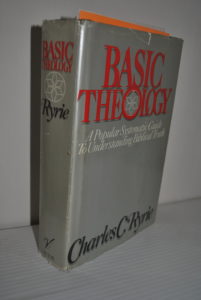The Perfections of God

Basic Theology
Ryrie’s Basic Theology
Charles C. Ryrie, Basic Theology, Victor Books, 1986, p. 36.
The perfections of God describe equally the Father, the Son, the Holy Spirit. Most theologies offer some classifications of God’s attributes.
- Nonmoral (or natural) and Moral Attributes
The former, like justice and holiness, to His will. But all of the so-called Nonmoral qualities are qualities of the most moral Being in the universe, and all the moral attributes are from the nature of God.
- Absolute and Relative
- Incommunicable and communicable
-
Go to https://www.facebook.com/groups/1965615970353666/ and ask questions or make comments. For FB posts each week, go to post page for each category.
Absolute attributes include those which belong to the essence of God as considered in itself (eternity, infinity), and relative attributes belong to the essence of God as considered in relation to His Creation (like omniscience). Again, this is an artificial distinction, since we are unable to make such a determination when, in fact, all of His attributes relate to His Creation.
The former are those which belong only to God (eternity, infinity), while the latter are those which are found in a relative or limited degree in people (wisdom, justice). But the communicable attributes are found in people, albeit in a limited way, not because God somehow communicated them, but only because mankind was made in the image of God.
Categories may serve some purpose, but in my opinion, not much. While some of the attributes may be classified into one or another of these suggested categories, some do not classify so easily. While holiness is generally listed as communicable, God’s holiness surely is not. While omniscience is surely incommunicable, mankind does have limited knowledge. The classification often becomes more arbitrary that obvious. The important consideration is the study of the perfections themselves, not classifying them. And to that we now proceed. First of 14 categories.

Basic Theology




